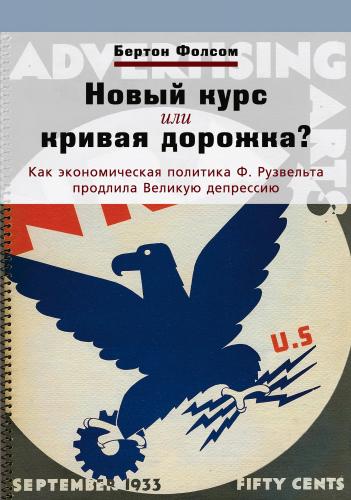109
R. W. Johnson to N. J. Harkness, April 28, 1934, in Borah Papers, LC.
110
“Cruel and Unusual,” Washington Post, April 22, 1934; “Tugwell Vs. Maged,” New York Herald Tribune, April 23, 1934. См. также газетную вырезку “Jailing of Tailor Called Necessary,” no date, Borah Papers, LC.
111
Washington Post, April 22, 1934; New York Herald Tribune, April 23, 1934. Магид скончался от рака в 1939 г. в возрасте 54 лет. См.: Time, April 10, 1939.
112
Oneida Cedar & Lumber Company to Hugh S. Johnson, August 24, 1934; A. Rollman to William Borah, 28 August 28, 1934, in Borah Papers, LC.
113
C. J. Gilbert to William Borah, August, 10, 1934, in Borah Papers, LC.
114
Armand L. Friedlander to Borah, August 8, 1934, in Borah Papers, LC.
115
Irving Fisher to Roosevelt, August 30, 1934, in Irving Fisher Papers, RPL. Фишер писал: «Если бы не страх работников и нанимателей, вызванный некоторыми положениями Нового курса, то, думаю, мы могли бы выйти из депрессии много месяцев назад…» См. также: Bellush, The Failure of the NRA, 66, 161, 142–146. Подробнее о деятельности комиссии Дэрроу см.: Stephen J. Sniegoski, “The Darrow Board and the Downfall of the NRA,” Continuity (Spring/ Fall 1990), 63–83.
116
Bellush, Failure of the NRA, 136–141, 145, 148, 158–168; Ellis W. Hawley, The New Deal and the Problem of Monopoly (Princeton, N.Y.: Princeton University Press, 1966); Ohl, Hugh Johnson.
117
Hadley Arkes, The Return of George Sutherland: Restoring a Jurisprudence of Natural Rights (Princeton, N.Y.: Princeton University Press, 1994), 84–86; Hawley, The New Deal and the Problem of Monopoly, 128–129.
118
Philip B. Kurland and Gerhard Casper, eds., Landmark Briefs and Arguments of the Supreme Court of the United States (Arlington, Va.: University Publications of America, 1975), vol. 28, 836–837. Благодарю профессора Хедли Аркса за то, что он обратил мое внимание на этот источник.
119
Frank R. Kent, Without Grease: Political Behavior, 1934–1936 (New York: William Morrow, 1936), 136, 140.
120
Kent, Without Grease, 173; Ohl, Hugh Johnson, 265–267.
121
James S. Olson, Historical Dictionary of the New Deal (Westport, Conn.: Greenwood, 1985), 223–225; Hazlitt, Economics in One Lesson, 99 [Хазлитт Г. Экономика за один урок. М.: И.Д. Вильямс, 2007. С. 114].
122
Paul Murphy, The Constitution in Crisis Times, 1918–1969 (New York: Harper & Row, 1972), 137. Полезная книга для осмысления взглядов Рузвельта и его противников: Thomas Sowell, A Conflict of Visions: Ideological Origins of Political Struggles (New York: William Morrow, 1987).
123
Morgenthau Diary, January 4, 1937, RPL.
124
Samuel I. Rosenman, ed., The Public Papers and Addresses of Franklin D. Roosevelt (New York: Random House, 1938), II, 74.
125
Henry Steele Commager, ed., Documents of American History (New York: Appleton-Century-Crofts, 1968), II, 242–255. См. также: John T. Schlebecker, Whereby We Thrive: A History of American Farming, 1607–1972 (Ames: Iowa State University Press, 1975), 234–243; Murray R. Benedict, Farm Policies of the United States, 1790–1950 (New York: Octagon, 1966 [1953]), 207–401.
126
Schlebecker, Whereby We Thrive; Don Paarlberg, “Tarnished Gold: Fifty Years of New Deal Programs,” in Robert Eden, ed., The New Deal and Its Legacy (Westport, Conn.: Greenwood, 1989), 39–47.
127
Anthony J. Badger, The New Deal: The Depression Years, 1933–1940 (New York: Hill & Wang, 1989), 147; Joseph M. Jones, Jr., Tariff Retaliation: Repercussions of the Hawley-Smoot Bill (Philadelphia: University of Pennsylvania Press, 1934).
128
Harris Gaylord Warren, Herbert Hoover and the Great Depression (New York: Norton, 1967 [1959]), 172–177; Schlebecker, Whereby We Thrive, 236–237.
129
Henry A. Wallace, New Frontiers (New York: Reynal & Hitchcock, 1934), 172–173; Paul Findley, The Federal Farm Fable (New Rochelle, N.Y.: Arlington House, 1968), 17–46; Van L. Perkins, Crisis in Agriculture: The Agricultural Adjustment Administration and the New Deal, 1933 (Berkeley: University of California Press, 1969); William D. Rowley, M. L. Wilson and the Campaign for Domestic Allotment (Lincoln: University of Nebraska Press, 1970).
130
Wallace, New Frontiers, 163–164; John L. Shover, First Majority – Last Minority: The Transforming of Rural Life in America (DeKalb: Northern Illinois University Press, 1976); Schlebecker, Whereby We Thrive, 286–287. О происхождении идеи паритета цен см.: Rowley, M. L. Wilson; Gilbert Fite, George N. Peek and the Fight for Farm Parity (Norman: University of Oklahoma Press, 1954).
131
Henry Hazlitt, Economics in One Lesson (New Rochelle, N.Y.: Arlington House, 1979 [1946]), 92 [Хазлитт Г. Экономика за один урок. М.: И. Д. Вильямс, 2007. С. 105].
132
Schlebecker, Whereby We Thrive, 245-46, 252, 297–98, 306, 312; Shover, First Majority – Last Minority, 152–158.
133
Badger, New Deal, 152; Schlebecker, Whereby We Thrive, 238.
134
United States v. Butler, 297 U.S. 1 (1936), 76.
135
Rosenman, Public Papers, IV, 432–433.
